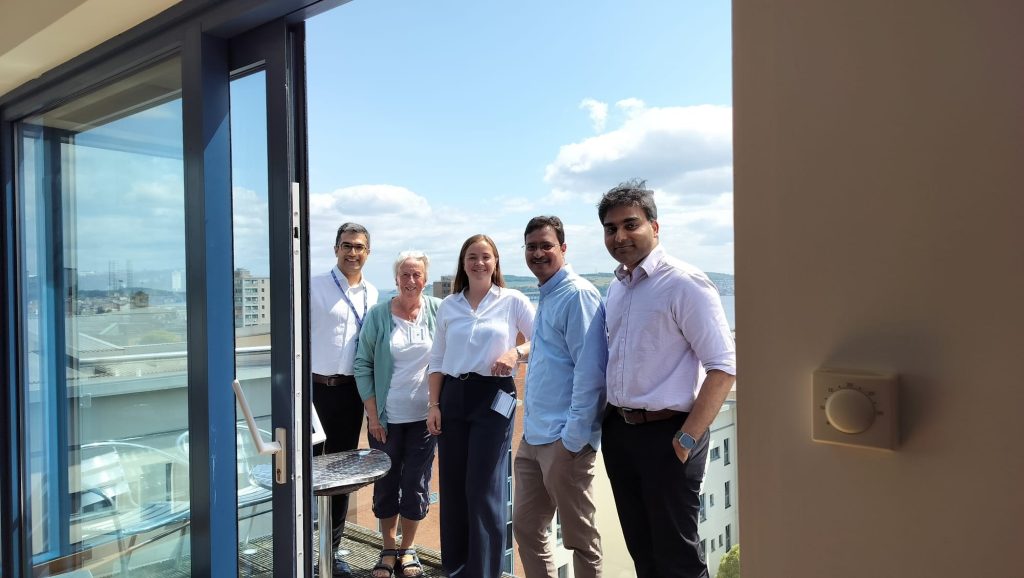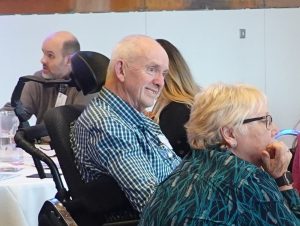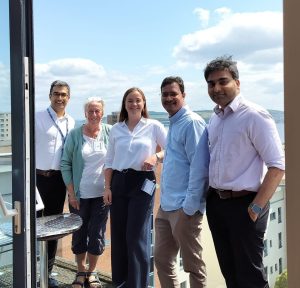What is MND
Find support
I have MND
I am supporting someone
Get involved
Research
About MND Scotland

Since the 1980s, MND Scotland has funded research which aims to improve the lives and outcomes of people living with MND. This mission still holds true today as we continue to fund and support important research that will progress us towards our vision of a world without motor neuron disease. To read more about our currently funded research, click here.
A key part of our research efforts is to help make time count for people affected by MND. Research into MND care is important for those living with and affected by MND, ensuring that the standards of care are constantly improving for those it impacts. We asked David to speak about his experiences using SpeakUnique and voice banking, and how this technology research has affected his day-to-day.
“I banked my voice soon after I was diagnosed, although it was several years before I needed to use it. As the research has developed and the technology improved, the recording process can now be done at home, but when I recorded my voice, it required a trip to the Anne Rowling clinic in Edinburgh to record it in the studio there. I expected to be asked to read out various sentences, but was shown various (nonsensical!) phrases to say. It was hard to keep a straight face reading out complete gibberish, not helped by being able to see my wife laughing at my attempts. The reason for not using logical sentences was the need to harvest syllables, without inflexions or emphases, which would have been hard to achieve otherwise.

“SpeakUnique is not very practical for a running conversation, but it is a huge benefit when you can type in what you want to say in advance. I have used it for ordering in cafés and restaurants and to prepare several questions for a hospital anaesthetist when I needed reassurance. I have also used it to make a short speech at a big birthday dinner.”
MND Scotland is currently funding several projects looking at improving care for people living with and affected by MND and is proud to help support people like David who benefit from improvements in MND care, from technology to medical & scientific practice. You can read about one of these projects here, which developed a tool, TiM, which helps improve care for people with MND.
Another major part of our research is to understand MND so that we can identify viable targets for drug development. We’ve asked Alan, a person affected by MND who is also a member of our Scientific Advisory Panel, about his views and experiences on research to identify targets for therapies and mechanisms behind MND.
“In more recent years, the MND community has had much better access to helpful information, often provided by charities such as MND Scotland. As part of this information flow, we now have a better appreciation of MND research. Recent LEARN events organised by MND Scotland have allowed the MND community to meet with researchers, thereby enriching mutual understanding. Improved access to information means we are improving our understanding of the mechanisms behind the disease and are more able to focus on the wide range of research. Of particular interest to the community currently, is the concept of identifying biomarkers and developing effective diagnostic tools.

“In the past, patients were often unable to join clinical trials, but now these trials can often be accelerated, allowing a higher level of patient involvement. Our community wholeheartedly welcomes this greater opportunity to participate and be more engaged in the research process.”
MND Scotland is very invested in what research the MND community is interested in, and we have been funding several projects focused on identifying biomarkers and improving diagnostic tools, including MRI-based projects at the University of Newcastle and the University of Glasgow. We have also recently published a blog about biomarker discovery in MND by a MND Scotland funded researcher at University of Nottingham. The researchers who receive our funding are critical to the process of making discoveries, with each one providing new pieces of knowledge to the MND puzzle.
MND Scotland is one of a number of UK organisations that make grants available throughout the year to fund and accelerate research, aiming to find meaningful steps forward in research. Marina became a (non-scientist) Lay-Reader last year as part of the Review Panel for the new MND Accelerator scheme, which awarded 12 projects a total of £6 million from the UK Government, funding secured as a result of the patient-led United to End MND campaign. We asked Marina to describe her time seeing and experiencing research and the impact that the grant had on the funded projects.
“On the 10th of June, I was both privileged and fortunate to be invited to Dundee University to visit the School of Human Sciences, where I met researchers who had received grants for two projects from the MND Accelerator scheme. Seeing the research and science, rather than just reading about it, was awe-inspiring. Learning about how stem cells are created; how they are then turned into motor neurons; and seeing them under a microscope, helped me understand some of the processes. It was heartening to hear how much quicker the science is happening, but also a reality check about the time it takes to achieve the right conditions.
“There is no doubt that inroads are being made. The money which is received from donations and grants is making all this research possible.
“I’d like to thank Arpan, Raja and Bhuvaneish for giving so much of their time and patience during my visit. The future for finding a cure for MND is in the hands of the most dedicated, focused and brilliant researchers.”

The new innovative experimental designs within the lab and in clinical trials are helping to push our knowledge forward and bring us closer to meaningful therapeutics for people living with MND. One of our funded projects, which started in October 2024, is looking for drugs that might help slow MND (find out more here), while our flagship investment is the MND-SMART clinical trial which continues to test new potential new treatments for people with MND (find out more here)
We enjoy being able to celebrate any opportunities that help further research, and we regularly advertise funding opportunities from other organisations, including from our international colleagues, in our researcher newsletter. One exciting new direction of travel, is the potential of AI technology to help automate and advance research to find a curative treatment for MND. This is the aim of the newly launched Longitude Prize. Primarily supported by the MND Association, this will offer ‘prizes’ to research projects that will further AI tech in MND research. These prize amounts will be substantial as there is a total of £7.5 million available. Find out more on their website.
Sign up
for newsletter
Get the latest news and events straight to your inbox.
You can help create a world without MND